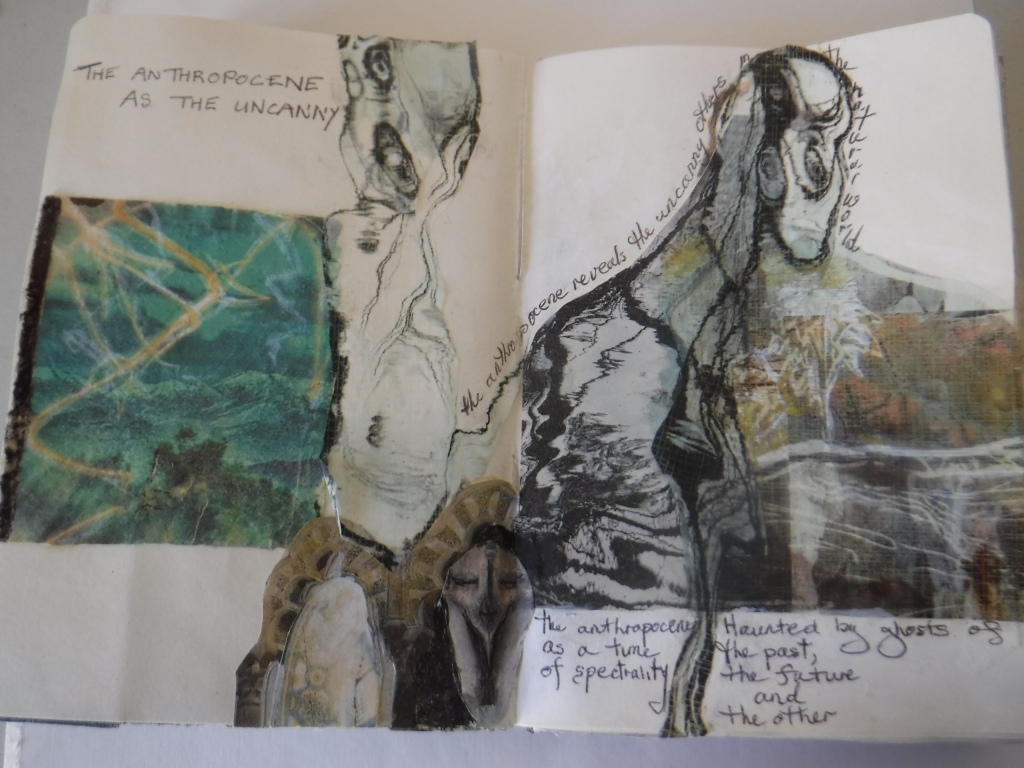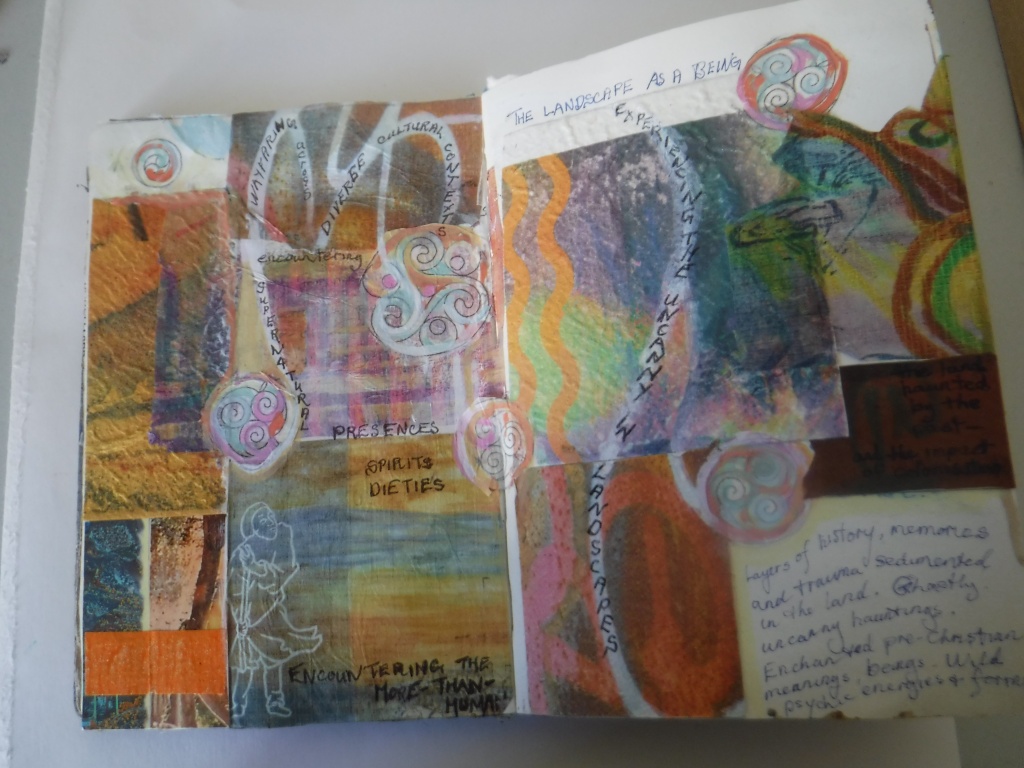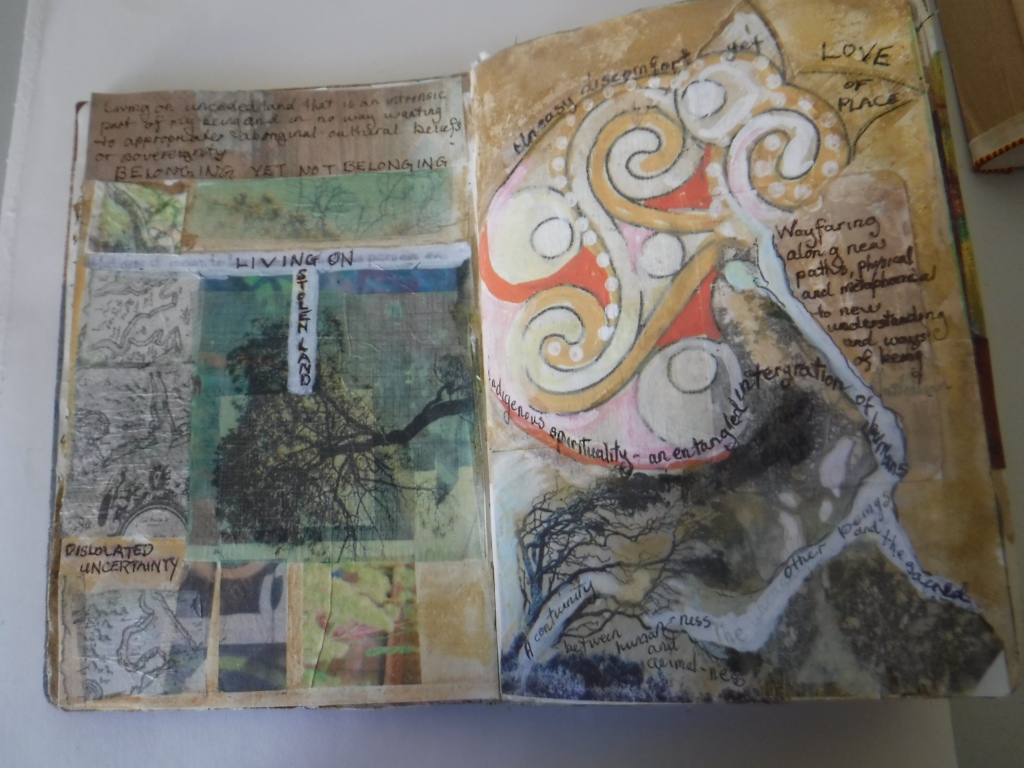The earth turns and the seasons shift. Here in Australia spring came early and it is already unseasonably warm. Bushfires are burning in the north of the country and the warnings about the developing el Nino weather pattern become increasingly dire by the day. Our Anthropocenic weather is uncanny, strange and unstable.
The anthropologists Nils Bubandt and Martijn van Beek consider the Anthropocene itself to be uncanny:- “the Anthropocene is a truly an uncanny time, a time when the proper separation between things – between culture and nature, subject and object, human and
nonhuman, life and non-life – is collapsing.” (https://anthropocene.au.dk/fileadmin/Anthropocene/MORE_THAN_HUMAN_vol.3.pdf)
The philosopher, Jacques Derrida saw the Anthropocene is a time when we are haunted by the spectres of ecological catastrophe, mass extinction and planetary crisis. This spectrality propels us into rethinking our relationship to the natural world as traces of all that has been excluded, repressed or forgotten by the dominant culture are exposed.

Here in Australia the trauma of our colonial past is currently being disclosed. Aboriginal people are speaking up about the true history of the country. Similar stories of the abuse of indigenous people under colonialization are coming to light across the globe. Massacre sites, places where children were stolen away from their mothers and where tribal ceremonies were disrupted are being revealed. Often there is something uncanny about these places. The rocks, hills and valleys seem to reverberate with echoes of past atrocities as if some deep psychic wounding has become embedded in the physical structure of the Earth.
Controlling people through colonial practices has occurred alongside the exploitation of nature. The Anthropocene is asking us to examine the human/nature split. At the same time indigenous people are asking us to examine our relationship with all people on Earth. A number of scholars suggest that slavery and European colonization define the Anthropocene. Others say the deforestation and development of industrialized agriculture on indigenous land as well the exploitation of indigenous people has played a significant part in causing our current ecological crisis. To fully deconstruct the way in which our thinking has bought us to our current ecological crisis we have to consider the impact of colonization.

There is a weirdness to these times. Our concept of what it means to be human is being called into a question but a deeper question also arises. Are all humans are equally implicated in behaving in ways that have bought us to ecological crisis of the Anthropocene? Indigenous cultures are living cultures that have operated in harmony with the Earth for countless millennia. Notions of the interconnectedness and interdependence of all life are fundamental to these cultures.
The ghosts of these cultures haunt us. As bushfires rage out control we learn of indigenous fire stick farming and how, in pre-colonial Australia, bushfires did not occur. More unsettling still, we learn that this fire stick farming was undertaken so that the people could grow food crops. Here where I live there are drawings done by early settlers that depict Aboriginal women harvesting yams. Across the country evidence is emerging that prior to white settlement Aboriginal people cultivated the land, established villages and built dams, weirs and food stores. The colonial idea that Aboriginal people were hunter gatherer nomads who lived at a subsidence level is being proven to be false.

I found today’s post difficult to write and even more difficult to draw to a conclusion. I’m finding that the deeper I dig into the idea of the Anthropocene as a cultural crisis the more it seems impossible that we can extricate ourselves from this mess. Being determined to find pathways through the impasse I am going to write about finding hope in the Anthropocene tomorrow.
,

Not only that : since we haven’t learned to live with grace (considering all of life as equal to that of humanity), we will have to consider our demise with as much grace as we can muster.
LikeLiked by 1 person
Wow. That’s a chilling thought and takes me into what I want to write about today. Thanks for airing it. These things have to be said.
LikeLiked by 1 person
By ‘our’ I mean Western peoples. Indeed indigenous communities globally knew their/our lives depend on preserving nature.
LikeLiked by 1 person
Yep. I totally agree.
LikeLiked by 1 person
So well said, Suzanne. It is hard to know what we know. I find it hard living in my white skin, the skin of the oppressor of people of colour all over the world. Have you seen The Rabbit Proof Fence? Films are now being made – finally – about how Canada did the same to our indigenous people. The cruelty is abhorrent and families are still suffering the impact of residential sschools. Our Tla-o-qui-aht people lived here for 10,000 years in harmony with Mother Earth. They have strict protocols about how resources are used and allowed to heal. How aghast they must have been to see settlers laying waste to everything. And we are still doing it even at the cost of our own survival. Blinded by greed. Horrific. So glad you are exploring all of this here.
LikeLike
Yes The Rabbit Proof Fence movie had a big impact over here when it came it. Over here we are voting to change our constitution in a few weeks. The proposed change is to create room for an Aboriginal Voice to Parliament. There is so much vitriolic racism here at present and so much misinformation being aired. Every now and then objective calm opinions are expressed. I’ll try and compile a list of some of them when I get to the end of this series.
Thanks for your support of my project. It’s much appreciated. I love reading everyone’s comments. They always shed more light on the issues.
LikeLike
It occurs to me that everything you have written here – poems and essays – would make a wonderful book. Keep going. It is making for a rewarding read!
LikeLike
Thanks so much Sherry. Yes, notions of some kind of book format have crossed my mind. I’ll keep going and consider what to do with it all when I get some kind of conclusion. 🙂
LikeLike
Unfortunately, I don’t think we humans will voluntarily deconstruct the industrial, profit-driven way of life. It will be deconstructed for us by Nature, as she effects the changes we have caused. Those who survive will have an opportunity to rebuild by different principles.
I agree with Sherry that documenting thoughts like yours will create resources for that reubuilding.
LikeLiked by 1 person
I totally agree with you Audrey. What I’m trying to establish here is that is indeed nature that is leading into us into the process of rethinking. It’s hard to get my thoughts into coherent sentences sometimes. Hopefully it will all get a bit clearer as I go along.
I’m glad you’re reading and will attempt to address at least part of your comment today. Thanks for contributing to the discussion.
LikeLiked by 1 person
That would be “rebuilding.” 🙂
LikeLiked by 1 person
The psychic wounds are indeed deep, extending and including both the earth and the creatures that inhabit it. If healing is possible, it will be painful. Relearning what ancient peoples knew about living with the land is a start, but too many are still not listening, refusing even to concede any error. (K)
LikeLiked by 1 person
I totally agree with your comment and will be delving into some of these topics today. Many people are vehemently opposed to changing and are digging in their heels refusing to acknowledge what’s happening. Audrey made a similar point. I’ll attempt to address at least part of it today.
LikeLiked by 1 person
This is a topic I am exploring a bit myself – the role of the global north in human and resource exploitation and how the climate situation is only reinforcing the old paradigm. I think I might include it in my climate poems. It is horrifying not just as history but in terms of what it means for the vulnerable countries in the immediate future.
LikeLiked by 1 person
It sounds like you are being very thorough you approach and are taking a much more practical line than I am. I have no idea of the long term consequences of any of this for anyone and can’t really speak about long term solutions. I did attempt to do that in a novel I wrote last year but it’s not my forte. What I am trying to do here is find my way through the impasse of anthropocentric thinking. I will plough on searching for the cracks…
LikeLiked by 1 person